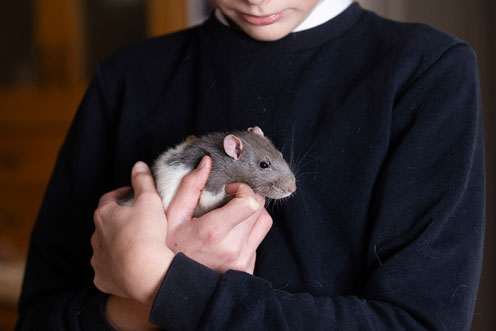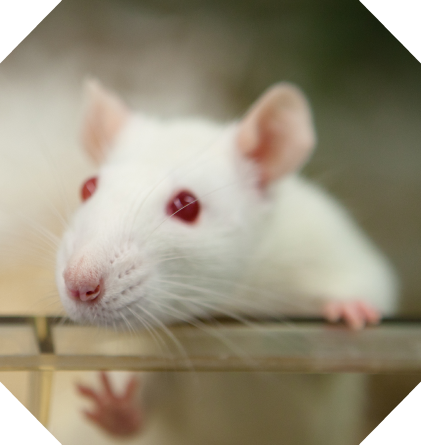The oldest recorded rat lived to be seven years old...
Fun facts about rats
Rats are complex and curious creatures, with fascinating personalities. Here are some of our favourite rat facts:
- Pet rats are also known as ‘fancy rats’
- A group of rats is called a mischief
- Baby rats are called kittens or pups (and sometimes rattens)
- There are two types of rats in the UK: The brown rat – otherwise known as the Common rat, Sewer rat or Norway rat, scientifically called Rattus Norvegicus (also a great name for a rat) – and the rarer black rat, or Ship rat (Rattus Rattus).
- Domestic rats are descendents of the brown rat: Their biology and behaviours are very similar to that of their wild cousins.
- Rats have highly developed senses of smell, hearing and touch: Their excellent sense of smell, touch and hearing (they can hear ‘ultrasound’ noises) compensates for their poor eyesight, allowing them to navigate, find food, and communicate in their environment.
- Rats have interesting anatomy: They can't vomit, and they have continually growing teeth that they keep at the correct length and shape by gnawing on objects.
- Rats use their tails for balance: Their tales act as a counterbalance, helping to keep them steady and stable. Tails are also used to regulate body temperature and communicate with other rats.
- Rats have incredible memories: They learn quickly, memorising routes and pathways, and are able to recall what they’ve learned. They can also remember people, too.
- Rats can be trained: In fact, scientists in Belgium have trained rats to spot dangerous landmines and diseases like tuberculosis. You could try scent training your pet rat for fun, or teach them to high-five!
- Rats, despite their reputation, like to stay squeaky clean: Grooming is part of their daily routine.
- Rats have likes and dislikes: They like sleeping in late, exploring their surroundings and spending time with company (human and rat, alike). But they don't like loud noises, wide open spaces or too much time alone.
- Rats don’t sweat: They don’t pant and their only sweat glands are on their paws, which isn’t enough to cool them, so instead, their naked tails regulate their temperature.
- Some rats (but not all!) are strong swimmers: Some can swim over a mile at a time!
- In some cultures, rats were considered lucky: Like in Ancient Rome. In Ancient Egypt, they were even worshipped.

How long do rats live?
Pet rats have a lifespan of around two to three years – though some may live longer. This might seem like a short time compared to other pets, but owning a rat is still a big responsibility.
Average timeline of a rat’s life:
-
Gestation period: 21 to 23 days
-
Sexual maturity reached: At 12 weeks
-
Average litter size: 6 to 11 young
-
Weaning period: 3 weeks
-
Puberty begins: Around 37 to 75 days old
Female rats typically live longer and mature earlier than males.
Each month of a rat’s life is equal to about 2.5 years of ours. When a rat is 3, they’re 90 in human years.
Are rats nocturnal?
Rats are nocturnal, which means they’re active throughout the night, and at dusk and dawn. They sleep during the day and, like humans, rats go through multiple stages of sleep, experiencing slow-wave sleep to REM sleep. They even dream!
Because rats are daytime sleepers, it’s best to feed and handle them in the morning and evening. You’ll also have to consider where you keep them. As they’re social animals, they like being somewhere they can see you. But as they have very sensitive hearing, you’ll need to keep them away from things that might disturb their sleep, like vacuums, speakers, and washing machines.
did you know?
test your knowledge
Domestic rats live much longer than their wild cousins due to having more access to food, water and veterinary care, and being safe from predators.
Rat body language
Rats, like us, experience a range of emotions – and communicate them through body language.
- Rats laugh when they’re tickled: Scientists have found that when rats are happy or excited, they emit very high-pitched squeaks (too high for us to hear), which is rat ‘laughter.’ Like people, rats giggle when they feel joy.
- Rats recognise people: They also remember the person who tickled and played with them, recognising humans who’ve been kind and loving. They develop a connection with that person, often preferring their company.
- Rats’ ears turn pink: Another way to tell if a rat is happy is when their ears turn pink!
- Rats get the zoomies: When they’re feeling playful, rats will bound across the floor, jumping and darting about. This is called ‘popcorning’ (like kernels of corn popping).
- Rats grind their teeth: When a rat is feeling content they grind their teeth, otherwise known as ‘bruxing’ – like a cat’s purr. However, teeth grinding can also be a sign of stress, anxiety or pain in rats, so it's important to always consider their body language and overall context of the situation.
- Rats bulge out their eyes: If you ever see your rat vibrate gently, their eyes bulging, that’s them ‘boggling,’ which means they’re incredibly happy. However, if you notice that their eyes bulge more than usual, or the eye(s) don’t return to the socket, this could also be a sign of stress or disease – if this happens, seek vet advice immediately.
Rats have fascinating personalities; they also feel things like fear, curiosity, annoyance and excitement.
Do rats need company?
Rats play together, eat together, tend to the elders and sleep in a big ‘rat pile.’ They’re creatures of community, so should never be kept alone.
Though they do bond with their owners, it’s best to keep rats with other rats, so they have a friend around at all times (usually another rat of the same sex, otherwise you might come home to more rats than you left!)
We recommend adopting a pair, or a trio, of bonded rats in same-sex groupings, or spayed and neutered if they’re different sexes.
Did you know: Spaying or neutering a rat also prevents aggression and reduces the chances of females developing mammary tumors?
They’ll also need plenty of attention from you, too! Petting them, chatting to them, training them and providing treats are all great ways to spend time with your rats.
Outside of work, I’m passionate about my seven pet rats, and fancy rats in general! My life revolves around my mischief, and I love spreading the word about how wonderful, loving, clean and intelligent these little creatures are.
Do rats make good pets?
Rats make great pets. They’re small, clean, friendly, smart and playful – but still a big commitment. As each rat is unique, there’s no ‘perfect’ way to look after them, but they are very active animals that have complex diet, environment and health needs.
When you look after them well and treat them with kindness, you and your rat can form a deep bond. Rats thrive off good company, which is why we rehome them in pairs or trios, so they always have a friend nearby.
If you’re thinking of buying pet rats, or searching for rats for sale, consider adopting rats instead. We have many rats at our rescue centres just waiting to become your in-house companions.

Are rats a good pet for children?
Rats are easier to handle than smaller rodents, such as hamsters, and often enjoy the human interactions. However, rats can bite when frightened, like all small animals do, so you’ll need to supervise children when they’re handling rats, and teach them to be gentle with them.
Though rats are very clean, they can also carry diseases. The Centers for Disease Control and Prevention doesn’t recommend pet rodents, including rats, for families with children aged 5 or younger, pregnant women, or people with weaker immune systems, as they are at a greater risk of serious illness.
Top rat facts
- There are several different kinds of rat, varying mainly in colour.
- Like humans, rats go through multiple stages of sleep. Rats experience slow-wave sleep to REM sleep and even have dreams. They're normally active at night, at dawn and at dusk.
- Rats laugh when they're tickled. Scientists have found that when rats are happy or excited, they emit very high-pitched squeaks (too high for us to hear), which is rat 'laughter'. Rats remember which humans have tickled and played with them in the past, and prefer to spend time with those people. Another way to tell if a rat is happy is that their ears turn pink!
- They have an excellent sense of touch, and a wonderful sense of smell.
- Rats have interesting anatomy. They can't vomit, and they have continually growing teeth that they need to keep at the correct length and shape by gnawing on objects.
-
Rats live for around two years, but some may live longer. Although two years may appear a short time in comparison to other pets, owning rats is still a big responsibility and commitment.
There's no single 'perfect' way to care for rats, because every rat is unique and every situation is different. It's up to you how you look after them, as long as you make sure you give them everything they need.
Adopt a rat
Interested in keeping pet rats? Take a look at our pet search to see all the rats available for rehoming. You can also learn more about how to keep your rat healthy and happy in our guide to rat behaviour.
How to care for a pet rat
Rats have complex needs and feel a range of emotions – all of which need to be cared for.
Explore our full rat care guide below, including information on general health, home and environment, diet, behaviour and company.







